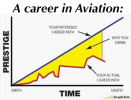I would not say they don’t take any suggestions. Though things take time, I have seen safety changes in the airlines that the military still hasn’t instituted. An example of this would be the Air Force E-11A that crashed in Afghanistan when the crew shut down the wrong engine. I’ve seen this several times with military pilots in training who respond immediately to an emergency… and do the wrong thing. Airlines have cut immediate action memory items to about 5. Engine failure/fire isn’t one of them.
There are reporting safety systems such as ASAP, and FOQA data that have helped in the airlines in making these changes.
Days off, depends. I’ve been off every Christmas and Thanksgiving in the airlines even though I’ve worked for 3, starting at the bottom each time. Granted, I may have had to go in late on Christmas Day, or get home Thanksgiving morning, but I’ve been there. More than I can say about the military. One just has to learn the “bidding system” and prioritize. Getting off those days may mean missing the 5 day trip to Milan, but I’ll take it.
There is an opportunity to “lead” if one wishes to go that route, becoming a chief pilot and advancing up that route from line pilot. Going instructor/standards.
In the airlines you are well compensated for hard work and that’s a huge difference from the military. In the military I came in and flew extra IP missions to get people up, always volunteered to be flight lead in combat missions, but was paid the same as the “seagull” who we had to throw rocks at to get him off the ground. In the airlines if you want to work the minimum you are paid the minimum. If you want to pick up trips and fly more you are well compensated.
The private sector also believes that time is money. They may require me to take a silly on-line touchy feely course, but they will pay me extra to do so.

